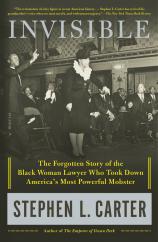Invisible: The Forgotten Story of the Black Woman Lawyer Who Took Down America's Most Powerful Mobster
Review
Invisible: The Forgotten Story of the Black Woman Lawyer Who Took Down America's Most Powerful Mobster
A good biography is a vivid portrait of its subject. A powerful biography is a mural, placing the subject in a study of the times in which he or she lived. INVISIBLE by Stephen L. Carter is the beautifully written, absorbing story of Eunice Carter, an African American lawyer who fought crime and the mob in the 1930s. It is a moving portrayal that has resonance in contemporary times.
Stephen Carter is the William Nelson Cromwell Professor of Law at Yale University. He clerked on the United States Supreme Court for Justice Thurgood Marshall, and has written six novels and eight works of nonfiction. In 1994, he penned the eerily prescient scholarly book THE CONFIRMATION MESS: Cleaning Up the Federal Appointments Process. In this latest effort, Carter had greater incentive to chronicle Eunice’s life: she was his grandmother, and this is her story. He writes with an additional goal: to tell the story of extraordinary people, a community that survived the wickedness of 400 years of oppression, a community that "made a way out of no way.”
"...the beautifully written, absorbing story of Eunice Carter, an African American lawyer who fought crime and the mob in the 1930s. It is a moving portrayal that has resonance in contemporary times."
Eunice Carter was born in Atlanta, Georgia, to college-educated parents. Her mother was a social worker, and her father was the founder of the black division of the YMCA. The family moved to Brooklyn in 1906, leaving Atlanta after the race riots of that year. Her family was only one generation removed from the vestiges of slavery. Her grandfather, Stephen Hutton, purchased his freedom from slavery before the Civil War. Eunice attended Smith College, graduating cum laude while earning both bachelor’s and master’s degrees. She began her career as a social worker, but found it less than rewarding. Although Eunice was married and a mother, she desired more for herself than being a housewife and community volunteer.
In 1927, Eunice enrolled at Fordham Law School, which was a difficult choice to make. Most law schools maintained a racial bar, and the American Bar Association would not allow black attorneys to join the organization until 1950. While Fordham was admitting blacks, Eunice faced the additional burden of surviving in an almost totally male profession. When she graduated in 1930, there were seven women and 364 men in her class.
After graduation, Eunice became actively involved in New York politics. In the late 1920s, that meant Republican politics. Their life in Atlanta caused her family to despise the Democratic Party, believing them to be the party of racism and hate. Eunice would eventually run unsuccessfully for office, but her candidacy brought her to the attention of prominent Republicans. After a grand jury in New York City demanded a serious investigation, Special Prosecutor Thomas Dewey was appointed to look into organized crime. Eunice was part of the prosecution team, the only woman and the only black attorney. In part, her selection came about because she lived in Harlem, where Dutch Schultz ran the policy rackets. Her appointment was a prominent news story; none of the other prosecutors was even mentioned.
It is the investigation and courtroom scenes where Carter brings his grandmother to life. As an attorney, he is conversant in the legal foundation upon which such a story must be constructed. His writing brings it to life in a way that few writers can accomplish. He avoids the legal jargon and terminology, telling a story that reads like a novel. It is a page-turner, even though the results are known to the reader well before the conclusion.
Carter is also honest about the difficulties and shortcomings in Eunice’s life. Her brother, Alphaeus, would be imprisoned for refusing to answer questions related to his association with the Communist party. Concluding his grandmother’s life history, Carter notes how her life crashed against the wall of race. His concluding words are a reminder to us all: “The wall is weakening. It did not fall in the lifetimes of Eunice and Alphaeus. It will not fall in ours. In the end, however, the logic of justice and the demands for freedom will overwhelm it.”
Reviewed by Stuart Shiffman on October 12, 2018
Invisible: The Forgotten Story of the Black Woman Lawyer Who Took Down America's Most Powerful Mobster
- Publication Date: October 8, 2019
- Genres: Biography, History, Nonfiction
- Paperback: 384 pages
- Publisher: Picador
- ISBN-10: 1250230667
- ISBN-13: 9781250230669




